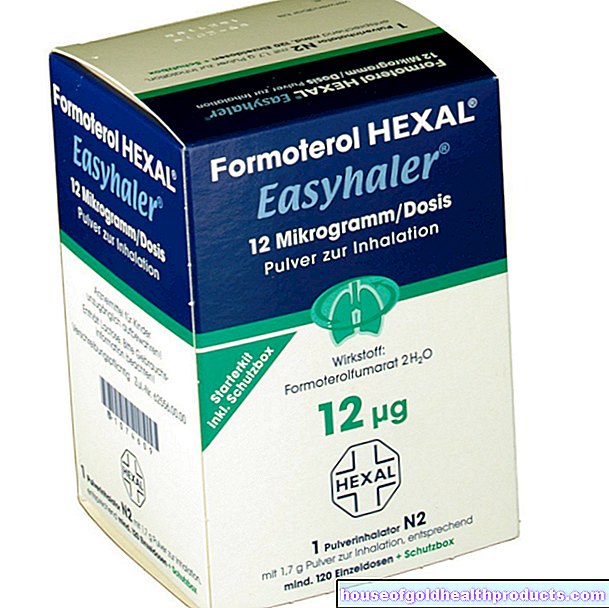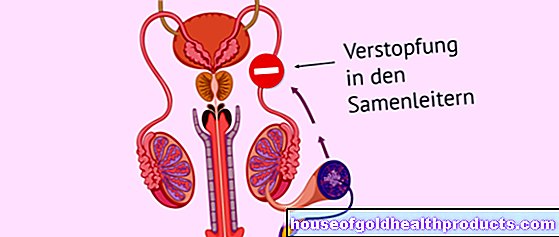Aspirin Plus C
All content is checked by medical journalists.Aspirin Plus C is used to treat symptoms associated with a cold. It helps with mild to moderate pain, as well as inflammation and fever. Here you can read all the facts about the Aspirin Plus C effect.
This active ingredient is in Aspirin Plus C.
The active ingredient combination of the Aspirin-Plus-C effervescent tablets consists of acetylsalicylic acid (ASA) and ascorbic acid (vitamin C). In this composition, the active ingredient not only provides pain relief, but also heals inflammation and reduces fever. It also prevents platelets from clumping together, which has a blood-thinning effect. The added vitamin allows a strengthening of the immune system and an accelerated effect of the preparation.
When is Aspirin Plus C used?
Aspirin Plus C is used for:
- mild to moderate pain (headache, toothache, menstrual pain)
- painful symptoms associated with a cold (headache, sore throat, pain in the limbs)
- fever
What are the side effects of Aspirin Plus C?
Common side effects of Aspirin Plus C are gastrointestinal discomfort (heartburn, nausea, vomiting, pain).
Occasionally, skin reactions (reddened skin, itching) are caused by an intolerance to Aspirin Plus C.
Cases of partially serious bleeding (cerebral haemorrhage, gastrointestinal bleeding, nosebleeds, bleeding gums, skin bleeding, bleeding of the urinary tract or genitals) have been reported rarely. The bleeding time is increased by taking Aspirin Plus C. If you have any bleeding, you should consult a doctor as soon as possible. In addition, gastrointestinal ulcers can develop, the consequence of which is very rarely a breakthrough.
Strong allergic reactions have been found especially in asthmatics. These allergic symptoms manifest themselves as a drop in blood pressure, shortness of breath, inflammation of the nasal mucosa, swelling of the tongue and larynx. Emergency medical treatment is necessary immediately. Serious skin reactions and gastrointestinal inflammation can also be possible reactions of the body.
The effects of Aspirin-Plus-C can very rarely be the reason for an increase in liver values.
If the side effects are severe or not listed, a doctor should be consulted.
Long-term use of Aspirin Plus C can cause a headache, which can lead to permanent pain with continued use of the painkillers.
Interactions with other drugs are possible with Aspirin Plus C. A simultaneous use of other medications should therefore be discussed with the attending physician. Interactions have occurred with these drugs:
- other anti-clotting agents (coumarin, heparin)
- Medicines that stop the blood platelets from sticking together (clopidogrel)
- other pain relievers and anti-inflammatory drugs (NSAIDs)
- Products containing cortisone or similar substances (not for external use)
- Medicines to improve the way the heart works (digoxin)
- Medicines that lower blood sugar levels (antidiabetic drugs)
- Diuretics (used to increase urine excretion)
- certain antihypertensive drugs (ACE inhibitors)
You should keep this in mind when using Aspirin Plus C.
The Aspirin-Plus-C effervescent tablet is dissolved in sufficient liquid before ingestion and drunk immediately. This should not be done on an empty stomach as it may cause stomach irritation.
The total daily dose of 3g for adults and a maximum of 1.5g for children aged six and over should not be exceeded. An overdose of Aspirin Plus C manifests itself in hearing disorders with ringing in the ears, sweating, nausea, vomiting, headache and dizziness. If you suspect that the dosage is too high, you should contact your doctor immediately.
Aspirin Plus C: contraindications
Aspirin Plus C should not be used in:
- existing intolerance to the active ingredients of Aspirin Plus C or other components of the drug.
- previous allergic reactions (asthma attacks) that can be traced back to substances with a similar effect
- Gastrointestinal ulcers
- increased tendency to bleed
- severely decreased kidney and liver function
- severe heart failure
Apart from that, taking Aspirin Plus C in the following illnesses or situations is only advisable with great caution and consultation with a doctor:
- in the case of known allergies, asthma, swelling of the nasal mucosa or permanent restrictions of the airways
- previous ulcer or bleeding in the gastrointestinal tract;
- impaired function of the kidneys and liver
- before operations
- if there are stones in the urinary tract
- in iron storage diseases
Aspirin Plus C: luxury foods
Consuming alcohol at the same time as Aspirin Plus C can increase the risk of gastrointestinal ulcers and bleeding.
Aspirin Plus C: children and adolescents
Aspirin Plus C should only be used in children and adolescents if other medications are not effective against a febrile illness. The intake should be discussed with a doctor, as Reye's syndrome has been observed in children in connection with Aspirin Plus C in very rare cases. This is a life-threatening disease that requires immediate medical treatment.
Aspirin Plus C: pregnancy and breastfeeding
Aspirin Plus C should only be taken in really necessary situations during the first six months of pregnancy. Aspirin Plus C must not be used in the last third to avoid possible complications before and during childbirth for both mother and baby.
Aspirin Plus C passes into breast milk in small amounts, which does not have any negative effects on the newborn if it is used infrequently. However, if the dose is prolonged or used in higher doses (over 150 mg per day), premature weaning may be necessary.
How to get Aspirin Plus C.
Aspirin-Plus-C effervescent tablets are only available in pharmacies, but are available in all pharmacies without a prescription.
Complete information on this drug
Here you can find the complete information about the drug as a download (PDF)
Tags: pregnancy smoking sports fitness





























